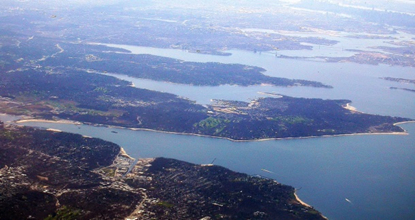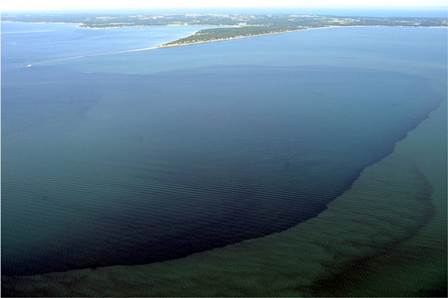Excessive loading of reactive forms of nitrogen to surface waters is degrading estuaries and coastal waters around the world. In and around Long Island NY, eutrophication is causing hypoxia, harmful algal blooms, fish kills, acidification, and loss of critical habitats such as seagrasses and salt marshes. While the impacts of nitrogen pollution may vary from embayment to embayment, the effects of nitrogen pollution are being experienced across Long Island.
Several research studies have utilized the Nitrogen Loading Model (NLM) to better understand the quantity and sources of nitrogen impacting Long Island’s bays and harbors. The NLM makes it possible to estimate the relative and absolute contributions of nitrogen from three major sources: wastewater, fertilizer, and atmospheric deposition. The outputs of such a model in combination with stakeholder input and other hydrologic, water quality and ecological data can be used to develop nitrogen reduction targets and strategies at the watershed scale to better manage for these coastal impacts.
See the links below for the full reports to these analyses for three different geographies: North shore of Long Island, the Peconic Estuary, and Great South Bay.
Modeling nitrogen source loads on the north shore of Long IslandThe Nature Conservancy
March 2016
 DOWNLOAD FULL REPORT
DOWNLOAD FULL REPORT 
3MB
Nitrogen load modeling to forty-three subwatersheds of the Peconic EstuaryThe Nature Conservancy
May 2014
 DOWNLOAD FULL REPORT
DOWNLOAD FULL REPORT 
2MB
Nitrogen Loading to Great South Bay
by Erin Kinney and Ivan Valiela, Marine Biological Laboratory; Woods Hole, MA
prepared for The Nature Conservancy, NYS Department of State, and Suffolk County
Land Use, Sources, and Transport from Land to Bay (Phase I)
April 2008
Management Scenarios (Phase II)
March 2011
For more information on these studies, please contact Stephen Lloyd at
slloyd@tnc.org.